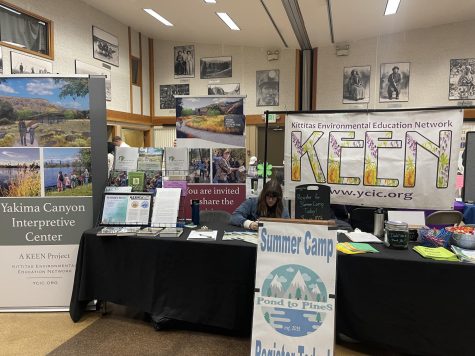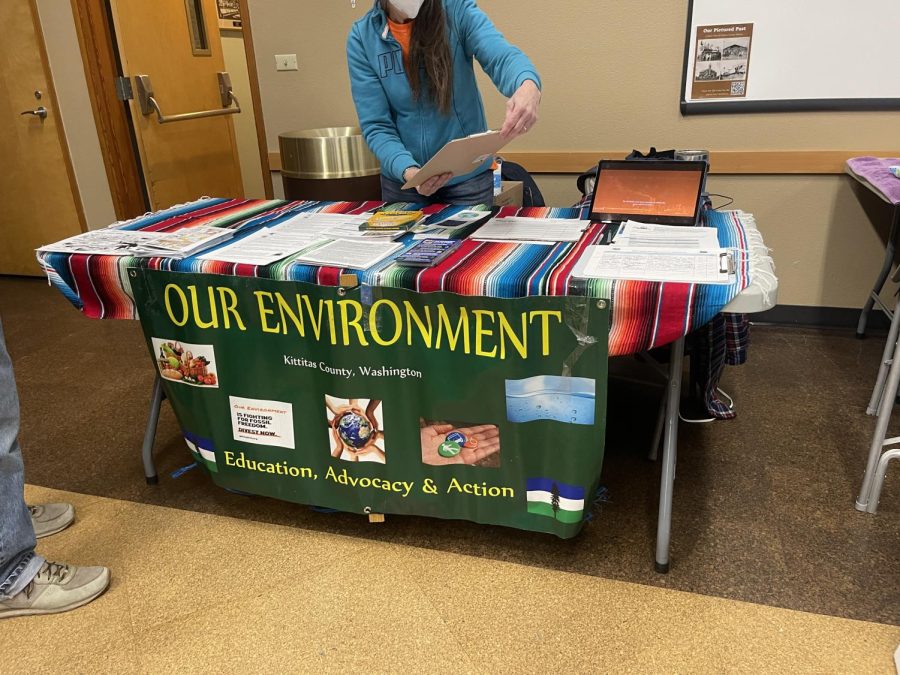Kittitas Environmental Education Network Winter Fair back in action for first time since pandemic
Our Enviroment Booth.
January 26, 2023
Groups and organizations ranging from APOYO, Our Environment, CWU’s Zooarchaeology and Anthropology and Biological Science departments, Mid-Columbia Fisheries Enhancement Group and others lined the Hal Holmes Community Center for Kittitas Environmental Education Network’s (KEEN) Winter Fair returned this past Saturday Jan. 21
The event returned to the Hal Holmes Community Center for the twelfth edition of the event, after a two year hiatus due to COVID-19.
According to KEEN Founder and President Jill Scheffer, the event highlights environmental education and sustainability projects from around the county.
“It’s a free community event, just highlighting organizations and businesses and individuals who are involved in sustainability in whatever form that looks like for them,” Scheffer said.
According to Scheffer, around 30 different organizations and groups attended this year.
“Some have a product that they make that’s sustainable that they want to show, others have an organization that does some work around sustainability or some education around sustainability they want to advocate for, it’s all kinds of things,” Scheffer said.
Each group showcased what sustainability means to them. For Suzzane Noble, it means recycling glass into an eco-friendly sand that can be turned into a variety of items.
“It’s used in artisan projects such as these beautiful earrings, it’s used in craft projects, it’s used in reptile, amphibian and fish tanks,” Noble said. “It’s also used in sandbags, it’s used in asphalt, it’s used in concrete, basically there are endless uses for this product.”
According to Noble, she started this project as a way to help reduce sand extraction from natural environments as well as find a way to make use of old glass.
For Kaylie Hamlin from the CWU Biological Science Department, sustainability means spreading awareness about invasive species and how they cause harm to local ecosystems.
“One of my greatest passions is to try to eradicate the American bullfrog from the area because they are extremely invasive,” Hamlin said. “When an invasive species enters an environment, things like extinction events occur, so it’s just super important to preserve our natural environment and things that are actually supposed to be here in Washington state.”

According to Hamlin, American bullfrogs have been causing havoc to the natural environment, even causing a reduction in native species like chorus frogs.
For KEEN Environmental Education Director Carlyn Saunders, sustainability means being able to educate the future generations about the environment.
“We focus primarily on environmental content and education in our summer camps,” Saunders said. “We do a lot of themes that focus on learning about different native species, plants and animals. We have programs dedicated to teaching kids about different career paths in all these different scientific fields.”
For Arcelia Kent from Eburg Veg, sustainability looks like educating people of the negative climate effects some of the food we eat has.
“55 percent of water consumption in the US is by animal agriculture, while only 5 percent of water consumption is by private homes,” Kent said. “One pound of beef takes 2,500 gallons of water. One gallon of milk takes 1,000 gallons of water. One pound of cheese takes 900 gallons. So what we eat can have a really big impact.”
According to Kent, animal agriculture is also a big contributor in greenhouse gas emissions, and going vegan or vegetarian can have a big impact on combating climate change.
Other groups included the Department of Ecology spreading awareness about the dangers of wildfire smoke, the Yakima Fly Fishers association advocating for Yakima River clean up projects and the Ellensburg High School Environmental Club advocating for local wildlife.
A program run by the Kittitas County Conservation District called the Heritage Garden Program was also included that encourages people to plant native plants to support indigenous wildlife.


